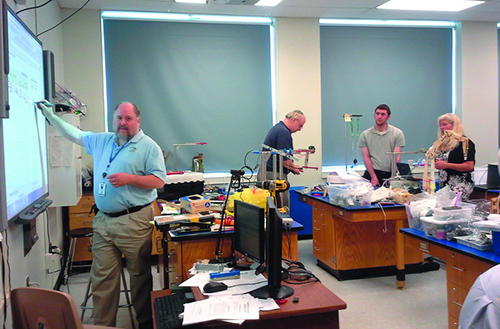

Elizabeth, NJ – The Jewish Educational Center of Elizabeth played host to the annual SET3 science and engineering program teacher-training series, led by JEC faculty veteran Joel Javitt. In SET3, teams of eighth graders compete to solve an engineering problem with societal benefit. Students build a working prototype machine, and in the process learn how to work in teams, to make written and oral presentations, and to use math problem-solving skills for real-world problems.
SET3 stands for Science, Engineering, and Technology, Teamwork, Training (T cubed), as the goal of the program is to enhance student interest in these fields. Javitt, who formerly worked at AT&T/Bell Labs, developed SET3 for the Center for Initiatives in Jewish Education (CIJE).
“SET3 lets students experience what it would be like to work in a company that engineers new products, and along the way they learn a lot about math, science, engineering, and teamwork,” Javitt said. “This kind of practical experience helps students focus their education on learning skills that will be useful to them when they start their careers.”
For teachers who guide the students through their SET3 projects, coaching engineering design is very different from teaching a class, and CIJE provides training to teach them the required skills. “The teacher training gives teachers the opportunity to understand the pedagogical design of the course,” Javitt explained. “They get to view the material through the eyes of their students by doing the same experiments the students would do.”
Carolina Biological, a major science supply company based out of Burlington, North Carolina, sent a representative to the teacher training to show how its equipment and lessons fit into the total course.
“I thought it was a really exciting program because we can bring kids closer to technology through active engineering projects,” said Priscilla Lainez, a science teacher at JEC’s Rav Teitz Mesivta Academy, who participated in the program. “I think they’ll benefit from it because it helps them connect what they know from a more traditional science class to things that are useful in modern society. In the teacher-training workshop, we learned the skills and training we need to bring a greater experience into the classroom.”
Participating schools who sent faculty to the training include: Brauser Maimonides Academy, Carmel Academy, Donna Klein Jewish Academy, Hillel Yeshiva–Deal, JFS (Staten Island), JEC’s Rav Teitz Mesivta Academy, SAR, Shalom Torah, Shaare Torah Boys, SSSQ, SSW, Yeshiva Darchei Torah, Yeshivat Noam, Yeshiva of Central Queens, Yeshiva of South Shore, Yeshiva Torah Vodaath, and YBH–Hillel.










